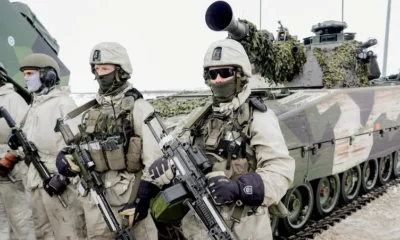Comment
Israel’s Strategic Shift: From Iranian Axis to Sunni Jihad Threat
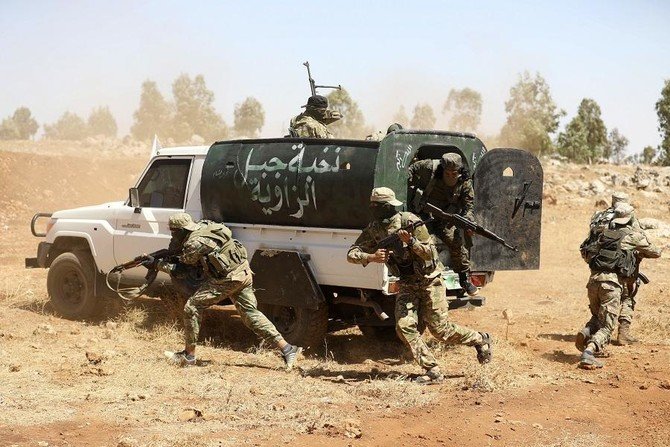
The fall of Damascus has brought a seismic shift to the Middle East, dismantling Iran’s carefully cultivated axis of influence while introducing a new and potentially dangerous reality for Israel and its allies. Decades of Iranian investments in Syria and Hezbollah have evaporated, leaving Iran’s Supreme Leader Ayatollah Khamenei embittered as the regime’s proxies crumble. However, the collapse of Assad’s regime and the emergence of a Sunni jihadist-led government in Syria present fresh challenges for the region, especially for Israel.
For years, Iran’s proxy network allowed it to project power across the region, with Hezbollah and the Assad regime serving as critical components. This network provided a direct land corridor from Iran to the Mediterranean, enabling Tehran to arm Hezbollah and threaten Israel’s northern border. But with Assad’s government ousted and Hezbollah severely weakened, that strategic corridor is gone. Iranian ambitions have suffered a devastating blow.
Yet, while the Iranian threat has diminished, a new danger looms: Sunni jihadist groups filling the power vacuum in Syria. These groups, currently vying for international legitimacy, could eventually set their sights on Israel. Israeli intelligence predicts that within a few years, the new Syrian leadership may frame the return of the Golan Heights as a sacred Islamic duty, reigniting territorial disputes under a jihadist banner.
For now, Israel celebrates the collapse of Assad’s regime, which had long symbolized tyranny and brutality. The liberation of places like Saydnaya prison, where unspeakable atrocities occurred, highlights the scale of the regime’s crimes. Videos of the horrors have surfaced, showing gallows, acid-dissolved bodies, and prisoners forgotten in underground cells. This marks a historic moment of freedom for Syrians, but it also exposes the fragility of the new order.
The West’s inaction during Syria’s civil war, particularly after President Obama’s failure to enforce a “red line” on chemical weapons use, set the stage for this prolonged conflict. The war’s butterfly effect reshaped global politics, contributing to the refugee crisis in Europe, Brexit, and even Donald Trump’s rise to power. Yet, the same Western indifference that abandoned Syrians also allowed Russia and Iran to dominate the conflict, prolonging the suffering.
Now, Israel faces a complex new reality. The shift from Shiite to Sunni jihadism reshapes the regional threat landscape. While Iran’s influence has waned, Turkey’s role has grown. Turkish-backed groups like Hayat Tahrir al-Sham (HTS) are cooperating with Ankara to consolidate control in Syria, including targeting the Kurds—historic allies of both Israel and the United States.
The Kurdish question adds another layer of complexity. As Turkey seeks to dismantle Kurdish self-rule, the U.S. has positioned itself as a defender of Kurdish autonomy, with approximately 1,000 American troops stationed in Syria. This has created tensions within NATO, as U.S. and Turkish interests diverge dramatically. Israel, meanwhile, has used its influence in Washington to advocate for Kurdish interests, viewing the Kurds as a counterweight to hostile forces in Syria and Iraq.
The fall of Damascus signals both opportunity and peril. While Iran’s regional ambitions have been dealt a severe blow, the emergence of Sunni jihadist forces and Turkey’s growing influence present new challenges. The Golan Heights, a critical buffer for Israel, could become a flashpoint once again as Syria’s new leaders consolidate power.
As Israel recalibrates its strategy, it must remain vigilant, preparing for the inevitable rise of a new adversary. The Middle East is entering uncharted territory, and the path forward will test Israel’s resilience and adaptability in the face of shifting threats.

Comment
Is Washington Forcing Tehran to the Table — or to the Brink?

Warships in the Gulf. Tariffs on Iran’s trade partners. Quiet talks in Oman. Maximum Pressure is back — but is it leverage or escalation?
The return of “Maximum Pressure” is not just a policy shift. It is a performance of power.
The Trump administration has revived its coercive diplomacy toward Iran with calculated intensity: a reinforced U.S. naval presence in the Gulf, sweeping economic threats, and a parallel diplomatic channel through Oman. The choreography is deliberate. Force is visible. Negotiation is quiet. The message is unmistakable — Washington wants a deal, but on its terms.
At the center of this strategy is economic isolation. A February 6 executive order threatening 25 percent tariffs on countries trading with Iran effectively extends U.S. sanctions outward, pressuring third parties to choose between access to the American market or engagement with Tehran. It is not simply punishment; it is structural coercion. The global trading system becomes an enforcement tool.
The military dimension reinforces that pressure. The deployment of the USS Abraham Lincoln Carrier Strike Group signals readiness without declaring war. President Donald Trump has warned of consequences “far worse” than previous strikes, invoking the June 2025 U.S.–Israeli campaign against Iranian targets. That precedent changed the calculus. Tehran can no longer assume rhetorical threats lack follow-through.
Yet the armada is paired with diplomacy. Indirect contacts mediated by Oman have been described as constructive. Neither side appears to seek full-scale conflict. A major invasion remains improbable in the near term. The more plausible trajectory is continued pressure aimed at extracting concessions — on nuclear enrichment, missile development, regional proxies, and internal repression.
The core obstacle is scope. Iran appears prepared to negotiate within a narrow nuclear framework. Washington demands broader behavioral change. That gap defines the risk.
If talks collapse, targeted strikes on nuclear or missile infrastructure become more likely. Maritime friction in the Gulf — especially between U.S. vessels and the Islamic Revolutionary Guard Corps — raises the possibility of miscalculation. Even a limited exchange could spiral.
But the objective is not regime change. It is strategic realignment. Maximum Pressure is designed to force integration into a U.S.-defined regional order without overt war.
The question now is psychological, not merely military: Does Tehran view this as theater — or as a credible promise? The answer will determine whether Muscat becomes the venue of breakthrough or the prelude to escalation.
Comment
Turkey’s Expanding Military Role in Somalia Raises Strategic Questions for Somaliland

Ankara says “stability.” Somaliland sees risk. The Horn of Africa is entering a new strategic chapter — and the stakes are rising fast.
When Turkish warships docked in Mogadishu, alongside reports of F-16 fighter jet deliveries and offshore drilling plans, the signal was unmistakable: Ankara is deepening its footprint in Somalia. For Somaliland — whose collective memory still carries the trauma of the 1988 bombardment of Hargeisa by the regime of Siad Barre — the optics alone are unsettling. Military expansion in Mogadishu is rarely viewed as defensive. It is viewed through history.
Yet a sober assessment of the Turkey–Somalia defense and economic framework suggests a more complex reality. Turkey is unlikely to launch — or support — an offensive campaign against Somaliland. The strategic costs would be immense.
As a key member of NATO, Ankara positions itself as a regional stabilizer, not a proxy combatant in Somalia’s internal territorial disputes. An unprovoked escalation against a relatively stable and democratic territory with informal ties to the United Kingdom, the UAE and Ethiopia would undermine Turkey’s diplomatic standing at a time when it seeks influence across Africa and the Red Sea corridor.
Economics also act as a restraint. Turkey’s maritime doctrine — often described as the “Blue Homeland” — prioritizes sea lanes, energy access and trade routes. A regional war would jeopardize precisely the offshore prospects and shipping stability Ankara hopes to cultivate. Investors do not drill in active conflict zones.
Ethiopia further complicates any military calculus. Somaliland’s memorandum of understanding with Ethiopia creates a deterrent layer Ankara cannot ignore. Turkey maintains significant economic and defense ties with Addis Ababa; it is unlikely to risk indirect confrontation over Mogadishu’s maximalist claims.
Still, the danger lies less in intent than in imbalance. Advanced aircraft in a fragile security environment introduce new variables. Even if initially deployed against Al-Shabaab, the capability itself alters regional power equations. History in Somalia has shown how quickly state assets can be redirected.
Maritime cooperation carries similar risks. If Turkish-trained Somali naval units patrol waters claimed by Somaliland — particularly near the vital Berbera corridor — even minor incidents could escalate into diplomatic crises.
The most combustible element may be energy exploration. Should Turkish drilling vessels operate in offshore blocks Somaliland considers within its jurisdiction, a commercial venture could morph into a sovereignty dispute with international implications.
Turkey is not preparing an invasion. It is consolidating influence — military, economic and maritime — in a strategically vital region. For Somaliland, the challenge is not alarmism but strategy: direct engagement with Ankara, stronger regional integration with Ethiopia, and early internationalization of maritime boundary concerns.
In the Horn of Africa, power shifts rarely announce themselves loudly. They unfold quietly — until they don’t.
Comment
Tech Titan Explodes as Spain Moves to Lock Kids Out of Social Media

Europe tightens the net on Big Tech — and Musk is furious. Is Spain protecting children… or crossing into digital authoritarianism?
Tech billionaire Elon Musk on Tuesday launched a blistering attack on Spanish Prime Minister Pedro Sánchez, accusing him of authoritarianism after Madrid unveiled plans to sharply tighten regulation of social media platforms—particularly to shield minors from online harm.
The clash was triggered by Sánchez’s announcement of a forthcoming legislative package that would bar children under 16 from accessing social networks and impose meaningful age-verification requirements on platforms operating in Spain. Under the proposal, executives could face legal liability if their companies fail to remove illegal or hateful content, a move the government says is necessary to end what it describes as the digital “Wild West.”
Musk, who owns the social media platform X, responded with characteristic bluntness, labeling Sánchez a “tyrant” and using a derogatory nickname for the Spanish leader. The remarks underline a widening rift between U.S. tech leaders who champion minimal moderation in the name of free speech and European governments pushing for stricter oversight.
Spanish officials argue the measures are long overdue. Sánchez said platforms would no longer be allowed to rely on “easily bypassed checkboxes” to verify users’ ages and warned that failure to comply could have legal consequences for those at the top. The aim, he said, is to curb the spread of hate speech and protect young users from harmful content.
The dispute unfolds as the European Union intensifies scrutiny of major tech firms. Brussels has already fined X for breaching transparency rules, and regulators across the bloc are exploring ways to enforce digital standards more aggressively. On Tuesday, French authorities searched X’s Paris offices as part of an investigation into alleged algorithm manipulation and possible foreign interference—an inquiry that has summoned Musk to testify. X said it was “disappointed but not surprised,” rejecting the allegations and warning that the probe threatens free expression.
For Sánchez, the confrontation with Musk plays into a broader European push to reassert control over online spaces, particularly where children are concerned. For Musk, it reinforces his self-styled role as a global critic of regulation he views as censorship. As Europe presses ahead with tougher digital rules, the standoff highlights a deeper question: who sets the boundaries of speech and responsibility in an increasingly regulated online world?
Comment
How ICE Became Washington’s Breaking Point
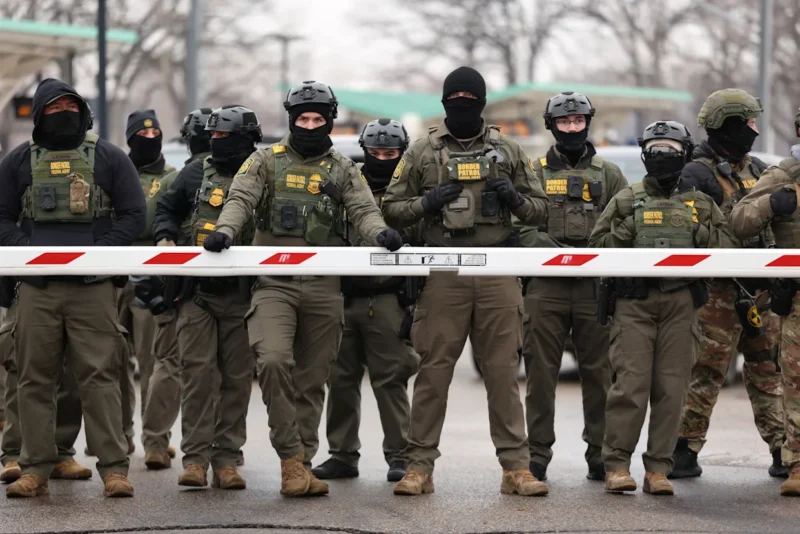
Masks Off, Cameras On—or Shutdown: Politics Return as Minneapolis Shootings Ignite DHS Showdown in Congress.
One shooting became two. Two deaths became a shutdown threat. Now DHS funding holds the government hostage.
Another U.S. government shutdown is looming, and this time the trigger is not abstract budget math but blood on the streets of Minneapolis.
With federal funding set to expire at midnight on Friday, Jan. 30, Senate Democrats are threatening to block any spending bill that includes funding for the Department of Homeland Security, escalating a standoff sparked by the fatal shooting of U.S. citizen Alex Pretti by a federal immigration officer. The killing came just weeks after another Minnesotan, Renée Good, died in a similar encounter — a sequence that has pushed immigration enforcement from a partisan dispute into a national reckoning.
At the center of the confrontation is Department of Homeland Security, which oversees Immigration and Customs Enforcement and Customs and Border Protection. For years, Democrats have criticized ICE’s tactics. Now, moderate senators who previously helped avert shutdowns are drawing a line.
“I hate shutdowns,” said Angus King, “but I can’t vote for a bill that includes ICE funding under these circumstances.” Colorado Democrat John Hickenlooper was blunter: “ICE is out of control.”
On Wednesday, Senate Minority Leader Chuck Schumer laid out a set of demands that amount to the most serious attempt yet to rein in federal immigration enforcement. They include tighter warrant rules, mandatory coordination with local law enforcement, a uniform federal code of conduct — and, most symbolically, a ban on masked agents combined with mandatory body cameras and visible identification.
“We want masks off, body cameras on,” Schumer said. “No more anonymous agents.”
Republicans see the demands as an effort to cripple President Donald Trump’s immigration crackdown. Democrats see them as basic guardrails after two citizens were killed in encounters with federal agents. The impasse has frozen what was, until days ago, a viable funding plan.
Congress had opted to split government funding into three bills. Two have already passed, keeping departments like Agriculture, Energy, and Justice open. The third — which includes DHS — narrowly cleared the House and appeared headed for Senate passage until the Minneapolis shooting shifted the political terrain.
Now Democrats say they will filibuster unless DHS funding is stripped out. They are willing to pass the rest of the government funding immediately, leaving DHS to negotiate separately. Republicans, led by Senate Majority Leader John Thune, insist on keeping the package intact. Thune has scheduled a vote for Thursday, widely expected to fail.
The White House is backing that approach. Press Secretary Karoline Leavitt said the administration wants the Senate to move forward with the full bill. Trump, for his part, has shown no sign of moderating enforcement tactics — and Democrats say executive promises are meaningless. “You cannot trust this administration,” said Nevada Sen. Jacky Rosen.
Procedurally, time is the enemy. Any change to the bill would require another House vote, but the House is currently in recess. Speaker Mike Johnson could recall lawmakers — or keep them away, as he did during the last shutdown.
If no deal is reached, the shutdown would be partial. Food assistance and national parks would continue. But air traffic controllers and TSA officers would again work without pay, federal workers would be furloughed, and loans, permits, and grant approvals would stall. Even if only DHS shuts down, agencies like disaster relief and the Transportation Security Administration lack the financial buffers ICE and CBP enjoy after last summer’s massive funding boost.
Cracks are also appearing inside the GOP. Republican Sens. Lisa Murkowski and Thom Tillis have called for DHS Secretary Kristi Noem to resign. Missouri Sen. Josh Hawley warned that current tactics are “not safe for anybody.”
Whether that unease translates into votes for reform remains unclear.
What is clear is that immigration enforcement has become the fulcrum of federal governance. Last fall, health care drove a record 43-day shutdown. Now DHS — and the conduct of masked federal agents on American streets — threatens to do the same.
The ticking clock is no longer just about funding. It is about accountability, trust, and whether Congress can still draw limits around executive power before the lights go out again.
Comment
Starmer in Beijing: Britain Recalibrates China Ties as U.S. Alliances Strain
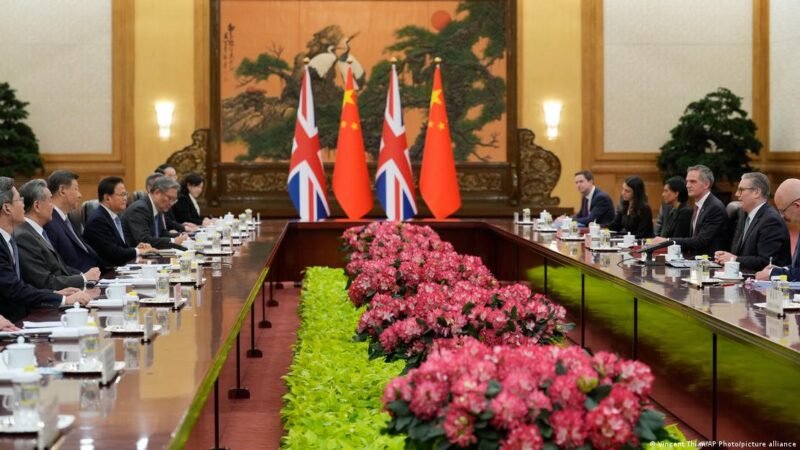
As Washington shakes alliances, Beijing opens its doors—and Britain walks in.
British Prime Minister Keir Starmer arrived in Beijing this week for the first visit by a UK leader since 2018, signaling a cautious but deliberate reset in relations with China at a moment of widening strain between the United States and its traditional allies.
Starmer’s three-day trip, accompanied by a sizable business delegation, places Britain at the center of a broader European diplomatic surge toward Beijing. The visit comes as U.S. foreign policy under Donald Trump injects volatility into transatlantic ties, pushing middle powers to hedge rather than choose sides.
Speaking en route, Starmer rejected calls for isolation, framing engagement as a matter of national interest. Britain, he argued, must remain vigilant on security while recognizing that disengaging from the world’s second-largest economy is neither realistic nor strategic. “It doesn’t make sense to bury our head in the sand when it comes to China,” he said, describing the visit as an opportunity to make “real progress.”
That message carried into his first meeting with Xi Jinping at the Great Hall of the People. Starmer told Xi that it had been “too long” since a British prime minister visited China and called for a “more sophisticated” relationship—language that suggests recalibration rather than rapprochement.
Xi, for his part, leaned into Beijing’s broader charm offensive. He urged the UK to work with China on global stability, climate change, and economic cooperation, arguing that past “twists and turns” in bilateral ties served neither country. As permanent members of the UN Security Council and major economies, Xi said, London and Beijing have a responsibility to deepen dialogue in an increasingly fragmented world.
Starmer is scheduled to meet Premier Li Qiang before traveling to Shanghai, where he and roughly 60 representatives from business, sport, and culture will hold talks with Chinese executives. The emphasis on commerce underscores London’s pragmatic calculation: political differences persist, but economic gravity is hard to ignore.
Britain’s move mirrors a wider European trend. France, South Korea, Ireland, Finland, and Canada have all sent senior delegations to Beijing in recent months. German Chancellor Friedrich Merz is expected to follow soon, reinforcing the sense that Europe is probing a more autonomous China policy as U.S. trade and security commitments appear increasingly conditional.
China, meanwhile, is exploiting the moment. After years of diplomatic retrenchment during the pandemic, Beijing is once again hosting foreign leaders, positioning itself as a predictable partner amid Western turbulence. Trump’s own planned trip to China in early April only sharpens the irony: allies are engaging Beijing partly because Washington has become harder to read.
The visit is not without friction. Plans for a large new Chinese embassy in London have sparked domestic criticism, and unresolved issues—most notably the erosion of freedoms in Hong Kong—hover over the talks. Starmer has declined to say whether he will raise sensitive cases such as the conviction of media tycoon Jimmy Lai, a silence that reflects the delicate balance he is trying to strike.
For now, Starmer is framing the trip as pragmatic statecraft rather than geopolitical defiance. He has played down suggestions that engaging China risks alienating the United States, or that Britain is embracing a “middle power” doctrine aimed at countering both Washington and Beijing.
“I’m a pragmatist,” Starmer said, “a British pragmatist applying common sense.”
In practice, that pragmatism marks a shift. Britain is no longer approaching China solely as a strategic problem to be managed, nor as a partner to be embraced uncritically. It is testing a narrower path—engagement without illusion, cooperation without alignment—at a time when the old certainties of the Western alliance are visibly under strain.
Comment
Stolen Aid, UN Prestige, and Parliamentary Violence Expose a State in Crisis
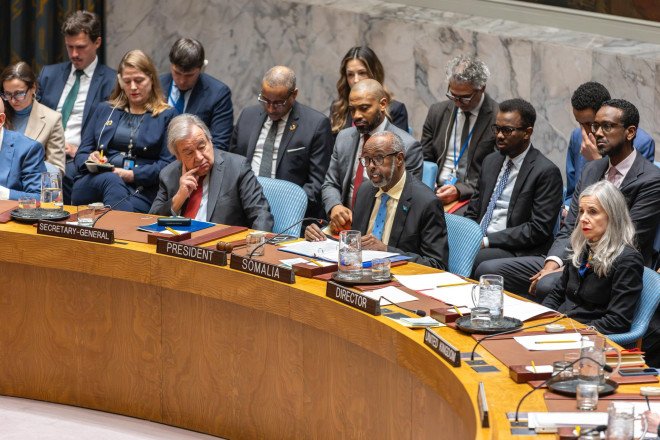
From the UN Chair to Chaos at Home: How Somalia Humiliated Itself on the World Stage.
Somalia chaired the UN Security Council — and collapsed politically the same week. This is not coincidence.
Somalia’s first time presiding over the United Nations Security Council since 1972 should have been a moment of national rehabilitation. Instead, it became a case study in contradiction — a symbolic elevation abroad paired with institutional decay at home.
On Monday, Somalia assumed the rotating presidency of the United Nations Security Council, convening a high-level session on the promotion of the rule of law. The meeting was briefed by António Guterres, African Union Commission Chair Mahmoud Ali Youssouf, and former International Court of Justice judge Abdulqawi Yusuf.
Yet the man who was supposed to personify this milestone — President Hassan Sheikh Mohamud — was conspicuously absent.
According to diplomatic sources, Hassan Sheikh was denied a U.S. visa and failed to attend Somalia’s most important multilateral appearance in half a century. In his place, Somalia’s UN ambassador, Abukar Dahir Osman, chaired the session. Formally, the event went ahead. Substantively, the absence spoke louder than any speech.
It was an embarrassment sharpened by timing.
Just days earlier, Somalia admitted responsibility for the theft of World Food Programme food aid from a warehouse at Mogadishu airport — aid funded largely by the United States and intended for starving civilians amid drought and climate shocks. The admission came only after Washington suspended assistance and demanded accountability. That stolen food was not abstract humanitarian loss; it was bread taken from the mouths of the hungry.
The optics were devastating. Somalia chaired a UN meeting on the rule of law while conceding it could not safeguard emergency food aid, and while its president reportedly failed to clear U.S. immigration scrutiny. Adding to the sting, the U.S. president had recently described Somalia as a “stateless place” — language Mogadishu publicly rejected, but privately reinforced through dysfunction.
Then came the implosion at home.
On the same day Somalia sought to project statesmanship abroad, its parliament descended into chaos. A joint session of both houses of the Somali Federal Parliament collapsed after shouting, bottle-banging, and physical violence erupted over a proposed constitutional amendment.
The agenda — amending Chapters 5 and 9 of the provisional constitution — was rejected outright by opposition lawmakers, who argued that with barely three and a half months left in the president’s term, any constitutional change would be illegitimate. The Speaker of the Upper House, Abdi Hashi Abdullahi, did not attend, underscoring deep institutional fractures.
The session disintegrated into fistfights. MPs traded blows. Threats were issued openly. One lawmaker warned that if Speaker Sheikh Aden Madoobe persisted with “unpopular agendas,” he would be removed from office. The parliament — with cameras rolling — became a physical battleground.
This convergence of events is not accidental. It reveals a system trapped in performative legitimacy: capable of occupying international chairs, yet unable to enforce order, consensus, or accountability at home. Somalia’s leadership speaks fluently in the language of multilateralism while failing the most basic tests of governance — food security, parliamentary procedure, and constitutional restraint.
Somalia’s UN presidency was described by its mission as “historic.” That is true. But history does not record symbolism alone. It records credibility.
On this dark day, Somalia demonstrated that prestige without discipline is hollow — and that the distance between the UN chamber and chaos in Mogadishu is far shorter than officials care to admit.
Comment
Is Xi Jinping Losing Trust in China’s Top Generals?

Inside the PLA Corruption Shock: When Loyalty Matters More Than Rank in Beijing.
China’s army isn’t fighting a war abroad — it’s fighting one inside its own command.
A sweeping corruption scandal inside China’s armed forces is raising a question once considered unthinkable in Beijing’s tightly controlled system: is President Xi Jinping losing trust in his own top generals?
Over the weekend, Chinese authorities confirmed investigations into two of the most senior figures in the People’s Liberation Army for “serious disciplinary violations,” the Communist Party’s standard euphemism for corruption. Those targeted include Zhang Youxia, one of Xi’s closest military allies and a deputy chairman of the Central Military Commission, as well as General Liu Zhenli. Both have been removed from their posts.
The implications are profound. The Central Military Commission is the nerve center of China’s military power, overseeing the army, navy, air force, rocket forces, armed police, and militia. Its chairman is Xi himself — a role widely regarded as more powerful than the presidency. Under China’s constitution, command of the gun rests with the commission, not the state.
This hierarchy reflects a long-standing truth in Chinese politics. Mao Zedong famously declared that political power grows out of the barrel of a gun, a principle that has shaped leadership transitions for decades. In 2005, Jiang Zemin clung to the military chairmanship long after stepping down as president, handing it to Hu Jintao only after a delay — a reminder that control of the PLA is the ultimate guarantor of authority.
That is why the fall of Zhang Youxia is especially striking.
Zhang was China’s highest-ranking uniformed officer and the only senior commander in the commission’s top tier with actual combat experience, having fought in the 1979 border war with Vietnam. Rising from an ordinary soldier to the pinnacle of the PLA, he embodied a traditional military career path increasingly rare in modern China’s politicized officer corps.
His political stature was just as significant. Zhang sat on the Communist Party’s 25-member Politburo and was promoted past retirement age, a clear signal of Xi’s personal favor. Their ties ran deep, rooted in shared family history and provincial origins.
Yet that proximity now appears to have become a liability.
Analysts see the investigations as part of Xi’s broader effort to reassert absolute control over the military — and to dismantle any networks that could rival his authority. The PLA Daily, the military’s official newspaper, accused Zhang of abusing the power entrusted to him by the commission chairman, warning that no rank or honor grants immunity. The language was telling: it hinted at factionalism, not just financial wrongdoing.
“Once trust is gone, the specific charge becomes a formality,” one regional security expert observed. In Xi’s system, loyalty outweighs experience, and perceived independence can be fatal.
The timing matters. Xi has poured resources into the PLA, doubling defense spending since taking office and demanding readiness for a potential conflict over Taiwan. Yet successive purges have hollowed out the upper ranks. With Zhang’s removal, the commission’s leadership is now devoid of commanders with battlefield experience — a reality that quietly unsettles military professionals even as Beijing projects confidence abroad.
Online, the public has noticed the contradiction. Dark humor circulates on Chinese forums: “The army is now fighting wars against its own generals.”
China continues to showcase naval power and military modernization, spending more than €220 billion annually. But beneath the parades and exercises lies a deeper tension. Xi’s anticorruption drive has evolved into something more existential — a struggle to ensure that the gun remains firmly in his hands, even if that means purging the very generals once considered indispensable.
In today’s China, the greatest threat to a commander may no longer be the enemy across the border, but suspicion in Beijing.
Comment
Arab League Mobilizes Against Somaliland
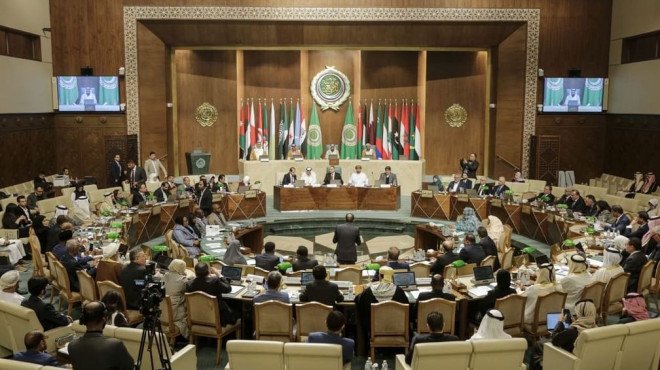
Arab Parliament Aligns With Somalia Against Somaliland in Post-Recognition Diplomatic Escalation.
The Arab Parliament’s declaration in Cairo rejecting Somaliland and pledging political action in support of Somalia marks a familiar reflex in Arab League diplomacy: preserve inherited borders first, question governance later.
Issued during the opening of its second general assembly session, the statement framed Somaliland’s emergence — and Israel’s recognition — as violations of “sovereignty” and “territorial integrity,” invoking non-interference while simultaneously endorsing active political mobilization against a self-governing state that has existed for more than three decades.
This contradiction is not accidental. It reveals the enduring preference within Arab institutions for juridical continuity over political reality — even when that continuity rests on a state apparatus that remains fractured, militarily dependent, and diplomatically reactive.
The timing matters. Israel’s recognition of Somaliland punctured a long-standing taboo in regional diplomacy: that the Horn of Africa must be filtered exclusively through Mogadishu. The Arab Parliament’s response is less about Somaliland itself than about containing the precedent. If one external actor can legitimize Somaliland, others may follow. Cairo’s message, therefore, is not aimed at Hargeisa alone — it is directed at every capital contemplating engagement beyond Somalia’s federal framework.
Yet this mobilization exposes more weakness than strength.
Somalia’s push for Arab backing arrives as the global narrative around failed governance is shifting. At Davos, U.S. President Donald Trump’s rhetoric reclassified chronic state failure not as a humanitarian dilemma but as a strategic liability. In that reframing, Somalia ceases to be a symbol of victimhood and becomes a case study in unmanaged sovereignty.
That shift matters deeply for Somaliland.
As Western policymakers harden their stance against exporting instability through migration and aid dependency, space opens for alternative African narratives — those rooted in territorial control, security provision, and institutional continuity. Somaliland fits that model. Somalia does not.
Mogadishu presents the Arab Parliament’s statement as a diplomatic victory. In reality, it highlights the fragility of its claim. The need to summon collective denunciations is itself evidence of declining unilateral authority. Sovereignty that requires constant reaffirmation is sovereignty under question.
Meanwhile, Somalia’s strategic alignment is narrowing. Its deepening reliance on Turkey and Saudi Arabia, combined with the breakdown of its partnership with the UAE, signals a retreat into patronage-based diplomacy rather than diversified engagement. Abu Dhabi’s recalibration is instructive: maritime security, energy corridors, and Red Sea stability demand partners who control territory and honor agreements. Somaliland does both.
Claims over Berbera, Bosaso, and Kismayo increasingly ring hollow in a diplomatic system that measures legitimacy through performance, not paperwork. Somaliland has held elections, maintained internal peace, and governed its territory continuously since 1991 — achievements few conflict-region states can match.
The Arab Parliament’s statement, then, is less a blockade against Somaliland’s future than a mirror reflecting the limits of Somalia’s present.
In the evolving Horn of Africa, recognition will not be granted by declarations alone — but by those who can demonstrate that sovereignty is something exercised, not merely asserted.
-

 Minnesota2 months ago
Minnesota2 months agoFraud Allegations Close In on Somalia’s Top Diplomats
-

 Middle East2 months ago
Middle East2 months agoTurkey’s Syria Radar Plan Triggers Israeli Red Lines
-

 Editor's Pick2 months ago
Editor's Pick2 months agoWhy India Is Poised to Become the Next Major Power to Recognize Somaliland
-

 ASSESSMENTS2 months ago
ASSESSMENTS2 months agoSomalia’s Risky Pact with Pakistan Sparks Regional Alarm
-

 Analysis2 months ago
Analysis2 months agoTurkey’s Expanding Footprint in Somalia Draws Parliamentary Scrutiny
-

 Analysis2 months ago
Analysis2 months agoRED SEA SHOCKER: TURKEY’S PROXY STATE RISES—AND ISRAEL IS WATCHING
-

 Somaliland1 month ago
Somaliland1 month agoF-35s Over Hargeisa: The Night Somaliland’s Sovereignty Went Supersonic
-

 Somalia2 months ago
Somalia2 months agoIs Somalia’s Oil the Price of Loyalty to Turkey? MP Blows Whistle on Explosive Oil Deal



